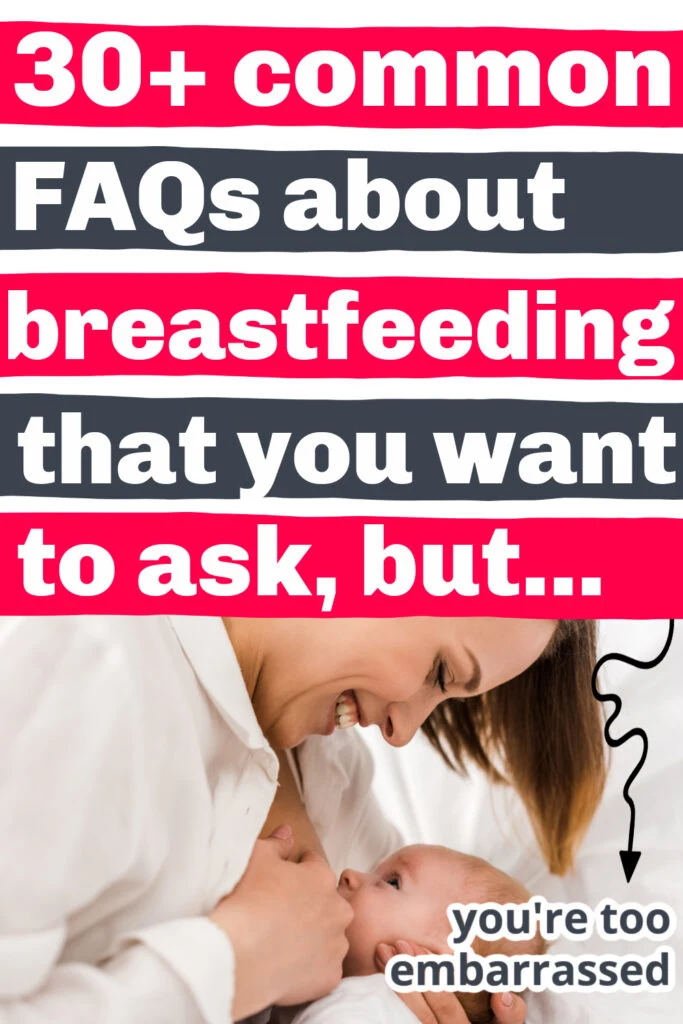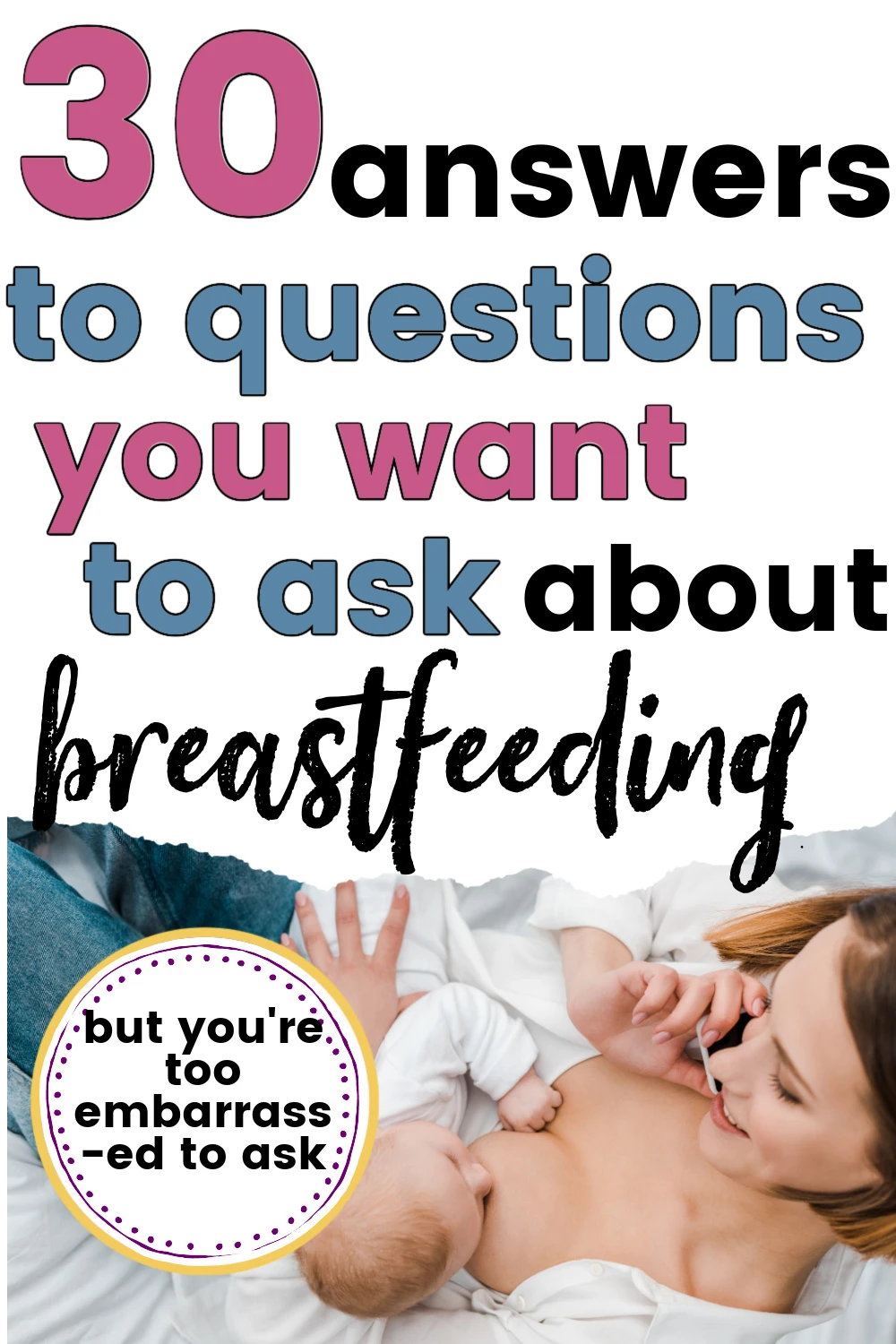Inside: You have so many burning questions about breastfeeding that you’re too embarrassed to ask. So I decided to answer over 30 frequently asked questions about breastfeeding – just like we’re two moms chatting over coffee. Included are several breastfeeding resources every breastfeeding mom should know about.
You have questions about breastfeeding? I’ve got answers, all in one place.
While I am no medical professional, I am an experienced breastfeeding mama!
(AND this post has been edited by a mom who breastfed all five of her babies – the first three for one year, and the last two for two plus years.)
You don’t want to ask your friends and sound silly but… you want to know the nitty-gritty on this whole breastfeeding thing.
You’ve got burning breastfeeding questions that feel really embarrassing to ask in real life, questions like:
- What does breastfeeding feel like?
- Do you do something to make the milk come out?
- Will breastfeeding hurt?
These are raw and real answers to your frequently asked questions about breastfeeding, primarily from my own experience.
You will find helpful articles attached to almost every question where you can go to get more information.

30 Breastfeeding Frequently Asked Questions
THIS POST PROBABLY CONTAINS AFFILIATE LINKS. AS AN AMAZON ASSOCIATE, I EARN FROM QUALIFYING PURCHASES. YOU CAN READ OUR FULL DISCLOSURE POLICY HERE.
Before we get this party started, you’ve gotta know something…
I have found an amazing online breastfeeding class that every new-to-breastfeeding mom needs to take. Yeah, it’s that good. The best part is that it’s only $19!
Here are some of the things you’ll learn in the class:
…the biggest mistakes new moms make when breastfeeding
…the best breastfeeding position for a good latch
…how to make sure your baby is getting enough milk
…a way to boost milk supply on demand
And way more… seriously, you’re going to want to check this out for yourself.
We’re gonna cover questions about all of it – from pumping, to nipples, to swollen boobs.
These are the questions you’re too scared to look stupid asking (#beenthere). So I’m gonna save you the embarrassment and answer these for you.
Let’s jump right in!
1. Do you have to put your baby on your nipple, or do they know where to go?
For the first month or two, you may need to help your baby get properly latched.
Babies are inexperienced nurslings, and sometimes need the assistance of mom.
Once your baby gets a little bit older, don’t you worry, he/she will know exactly where to go. Get your baby remotely close to your nipples and he/she will try to latch – even through a shirt!
Sometimes, problems can come up with latching, but I’ll get to that later.
A few helpful videos of real moms helping baby latch or allowing baby to self-latch:
- Newborn baby-led latching and the longer educational version of the same mom/baby
- Cradle Hold Mom-led latching educational video and shorter hands-on example
2. How can I “open my nipples” for breastfeeding?
You do not need to do anything to open your nipples for breastfeeding.
I might be alone in this but before I started breastfeeding, I thought that there is one large hole in nipples that milk would come out.
Nope! There are a bunch of tiny little holes all over your nipple that will spray little streams of milk.
3. Does pumping hurt your nipples?
In the very beginning, everything will hurt your nipples.
But after a little while, your body will get used to breastfeeding/pumping and it won’t hurt anymore.
If pumping continues to hurt your nipples, talk to a lactation consultant for help.
More Resources: Ouch! What If Pumping Hurts? by Nancy Mohrbacher, IBCLC
4. Can you breastfeed with small nipples?
Yes! One of the lactation consultants that we met with explained to me the various sizes of breasts and nipples that she had worked with.
She said that looks simply do not matter. Your baby will figure out how to nurse on your shape and size- go by how it feels.
Is it hurting? Is your baby gaining weight?
If it is not hurting you, your baby is gaining weight, but nursing looks different than other moms- so be it.
Own those small nipples, girl!
More Information: Flat or Inverted Nipples by Le Leche League
True Confessions: I was always afraid that my nipples were too small or flat to nurse.
To be 100% honest, I had a lot of growing pains in the first week or two of my breastfeeding journey. As my daughter nursed and I pumped, my nipples got elongated.
Your body will adapt to what your baby needs!
5. Do your boobs get really swollen and huge between every time your baby nurses?
Initially, yes.
In the first six weeks, your body regulates milk production. Your body will be very sensitive to feeding patterns while learning the needs of your baby.
In the in-between times, your body will store up milk so that at any moment your baby has plenty to drink. But, don’t worry, you won’t ever run out of milk.
Our body is constantly making more milk. It is just visibly noticeable the longer the time is between nursing/pumping.
More Information: Frequently Asked Questions About Milk Production by KellyMom
6. Did it hurt when you started breastfeeding?
Yes! Our daughter had oral ties (see towards end of post) which made nursing even more painful than what is to be expected.
For the first week or two, it is completely normal for breastfeeding to be uncomfortable as your body adjusts to having a little human sucking on your nipples.
After that, there may be up to 30 seconds at the start of each nursing session (when your baby latches) that are a little painful.
Breastfeeding should not hurt so bad that your toes curl or you are crying every session.
If you are having prolonged painful nursing sessions, seek help from a lactation consultant immediately!
More Information: Sore Nipples or Breasts? Here’s Help by KellyMom
7. How can I unclog my milk ducts naturally?
Here are some of the go-to home remedies for plugged ducts:
- Take a hot shower and massage your breasts in the shower.
- Wrap hot washcloths around your breasts while pumping or hand expressing.
- Nurse extra!
- Take sunflower lecithin. Lecithin breaks down fat molecules and so it will make your milk thinner and easier to travel through your breast.
If it any point, you see constant redness or streaking on your breast, contact your doctor. You may have mastitis, which is infection in the breast caused by clogged ducts.
Editor’s Note: I had mastitis with my last baby. It came on quickly, but not so quickly that I couldn’t have prevented it if I had taken the time to treat the obviously plugged duct when I first noticed the pain. Make it a priority to notice and treat clogged ducts ASAP!
More Information: Plugged Ducts and Mastitis by KellyMom
8. How do you get rid of breast engorgement?
Breast engorgement comes with the territory of newborn days.
Though you may be uncomfortable, don’t give in to the temptation to pump for longer than 5-10 minutes. Your body will take pumping as a signal that you need more milk, therefore, creating a bigger problem.
Try to hand express a little, or use a Hakaa hand pump.
9. Wait, one breast leaks milk while the other side nurses?
While you nurse on one side, the other side may leak a little bit. This is especially true if your breasts are very full.
When you have a letdown, your body lets down on both sides- even though your baby is only nursing on one side.
You can use cloths or nursing pads to deal with this, or especially in those early days when there is a LOT of leaking, you can catch the milk from the leaking breast in that Hakaa hand pump I mentioned. Less pumping later!
10. Is it okay if my baby only nurses on one side?
Occasionally, your baby will only want to nurse on one side. That’s OK! Sometimes your baby will get too full from one side and simply can’t drink anymore.
Be sure to alternate sides each session if your baby is only nursing from one side. Pump on the side that was not nursed from to maintain supply.
If your baby starts consistently refusing one breast, consult a lactation consultant.
11. What is block feeding?
Block feeding is when you nurse on only one breast for 3+ hours before switching to the other breast. This technique is used for slowing down milk production.
Please consult a lactation consultant before deciding to do block feeding. You can seriously mess up your milk supply if you do block feeding unnecessarily.
More Information: Block Feeding Dos & Don’ts by Nancy Mohrbacher
12. Can flat-breasted mothers breastfeed a baby?
Totally!
There is a teensy tiny percentage of women who physically cannot breastfeed, but it VERY rarely has anything to do with the size or shape of the breast.
More Information: Storage Capacity by KellyMom
13. Will I leak milk all day long?
Not necessarily. For the first several weeks, you might experience quite a bit of leaking.
You could start leaking randomly throughout the day but definitely expect to leak in the night.
Once your body is used to your babies typical eating routine, you will not experience as much leaking.
More about leaking at KellyMom.
14. How much milk do you make?
Your body will make exactly how much milk your baby needs at the time.
If your baby is sick or has hit a growth spurt and nursing more often, your body will make more milk.
If your baby isn’t nursing as often, your body will respond by making less milk.
15. How long does it take for your pregnant-looking postpartum belly to go away?
The large pregnant-looking belly goes away gradually over the first several weeks postpartum. I had excess weight at six weeks but no longer had the distended pregnant looking belly.
Breastfeeding often helps you lost the pregnancy weight more quickly…but not always.
16. How often should I breastfeed?
I tell everyone I know to read Tracy Hogg’s book The Baby Whisperer Solves All Your Problems.
This book is an amazingly comprehensive guide to babyhood, including how much milk your baby needs and how often at each age. I borrowed this book from our library and ended up buying it the next day.
She answers every question there is about babyhood, including many breastfeeding questions.
17. What does a breastfeeding let down feel like?
First off, a let down is when your body is releasing milk in a heavy flow. Some women never feel let down and for others, it is so strong that it feels a little painful.
I would say that let down feels like a strong tingling and panging sensation.
18. Does breastfeeding get easier?
Thankfully, yes!
In the beginning, both you and your baby are learning how to breastfeed. There is definitely a learning curve.
As both of you mature in your skills, it will get easier and it will feel like you have always known how to breastfeed.
19. How long should a baby breastfeed per session?
To keep this answer short, it depends on your babies age. As your baby gets older, he/she will become more and more efficient at the breast.
Refer to Tracy Hogg’s book, The Baby Whisperer Solves All Your Problems for helpful breastfeeding guidelines.
20. How long does it take for milk to come in?
Your milk will gradually transition from colostrum to mature milk around 3-4 days after birth.
21. How do you know if your milk has come in?
When you milk transitions to mature milk,
- your breasts will feel heavier
- you may become engorged.
- you might experience more leaking.
- the milk looks thinner than colostrum and is white.
22. Can milk come in before baby is born?
Yep! Your body starts making colostrum anywhere between 16-22 weeks pregnant.
More information on milk “coming in” by KellyMom.
23. What is colostrum?
Colostrum is the first kind of milk that your body will make after your baby is born. It is nicknamed liquid gold because it is so nutrient dense and has a beautiful golden yellow color.
- It is higher in protein than mature breast milk.
- Most moms will only produce an ounce of colostrum in the first 24 hours which is plenty for a newborn. Crazy, right?
- Your baby’s stomach is about the size of a marble and will only need 1 teaspoon of colostrum each feeding.
- Colostrum seals baby’s immature gut lining and clears the digestive tract.
- It boosts immune system and repairs the body.
Read more about colostrum on Mama Natural’s article – Colostrum: The Mind-Blowing Superfood for Your Baby.
24. How many times a day do I need to pump while breastfeeding?
If you are planning to exclusively breastfeed, then you do not need to worry about pumping. You might want to pump every once in a while so that you have a few bottles worth for a night out.
25. Do I even need to pump?
That all depends on what you want to do! If you are a stay at home mom and are exclusively breastfeeding, then you really don’t need to pump.
If you are a mom that is out about about more, you will need to pump so that you have milk to leave with baby.
Full-time working moms may need to consider exclusively pumping, but not necessarily.
Remember that breastfeeding class I mentioned? She also has a class all about pumping that is AWESOME. Check it out HERE.
26. Is it important to have a freezer stash?
I stressed about having a freezer stash and I really don’t know why.
I didn’t necessarily need to have a freezer stash because I seldom leave our baby with a sitter. It also doesn’t help that she won’t take a bottle.
Working moms, on the other hand, may feel better having a stash. But you need to keep in mind that the milk you pump when your baby is a newborn is not what she needs when she is three months old. Plus, there are differences in the milk you pump during the day versus at night.
Learn More: How to Store Frozen Breastmilk – A New Mom’s Guide
27. What does a mom feel when she breastfeeds her child? Does it change from when her partner sucks and nibbles her breasts?
Breastfeeding and foreplay are in such different categories mentally that they feel different physically. There is nothing erotic about feeding your baby- it feels natural and calming.
Physically, breastfeeding feels like tiny little tugs on your nipple.
28. Do women decide when to lactate? (and if my partner sucks on my nipples, will milk come out?)
Women don’t decide to lactate. The milk is always ready.
So, if you coax it out, it is there. So basically, yes, if your partner sucks on your nipples, milk will probably come out.
29. Is breast milk best, or is it all hype by the pro-lactation activists?
This is such a sensitive topic, so I want to be careful here. And I know you don’t want to ask it online because #mommywars.
Before I answer, you need to know that formula is an amazing invention that literally saves lives (and truly is the best choice for some women).
Besides the scientific research that I won’t go into here, one thing that suggest to me that breast milk is pretty dang amazing is formula companies constant reformulations. Formula companies work very hard to try to emulate the components of breastmilk.
Breastmilk is so very complex and perfectly designed that it cannot be recreated easily.
30. How do breastfeeding women feel about people sitting next to them in public?
I don’t care if people sit next to me! I appreciate when people treat me normally while I breastfeed in public.
Like, don’t treat me like I have the bubonic plague when you see that I’m nursing, okay?
31. What about tongue ties and lip ties? Will I know if my baby has one?
We had a very challenging time with nursing in the early days.
Every nurse that came in our room at the hospital helped us with breastfeeding. Each one taught us a different technique or offered a different reason why my baby wasn’t nursing well. So confusing!
It wasn’t until we saw our first lactation consultant that we discovered our daughter’s oral ties. She recommended we get it clipped as soon as possible at our pediatrician’s office.
Our daughter got her tongue tie clipped at three days old. Afterward, we saw improvement in nursing but we were still struggling. I had a lot of pain with nursing. My daughter was misshaping my nipples because of the way that she had to clamp down to nurse.
After many more visits with lactation consultants, we were referred to a dentist that does frenectomies by laser.
At two weeks old, she had her laser frenectomy. After that, we saw a vast improvement. It took about a week for us to get used to nursing again. Since then, we have been able to nurse without intervention.
Long story short, find an experienced lactation consultant in your area if you suspect your child has oral ties.
32. What if I don’t have enough milk? What can I do?
You definitely want to consult a lactation consultant if you believe you have low milk supply.
You can boost your milk supply naturally with things like THESE delicious lactation cookies, THESE breastfeeding smoothies and making sure that you are eating enough.
It can be challenging to keep up with your appetite in the early days between feedings and diaper changes, and, you know, sleep.
The easiest way I found to eat enough was to keep healthy snacks in the house at all times.
You can find a list of healthy breastfeeding snacks HERE and easy middle of the night breastfeeding snacks HERE.

Helpful Resources to Answer Additional Breastfeeding Questions
The following resources are sure to answer any more questions you have about breastfeeding.
You will probably notice that a couple of them are referenced quite frequently in this post!
The Womanly Art of Breastfeeding
My sweet grandmother sent this book to me when I was in the thick of newborn breastfeeding struggles. The Womanly Art of Breastfeeding saved me!
Put it on your baby registry and if it isn’t purchased, buy it for yourself.
Seriously, you won’t want to be without it.
KellMom.com
As you may have noticed, many of the resources on this post were by KellyMom.
This site is an excellent free resource for nursing mothers!
The Baby Whisperer Solves All Your Problems
I’ve already gushed enough about this book, so if you don’t have it already, get it.
Milkology’s Ultimate Breastfeeding Class
Save yourself time, worry and bleeding nipples (did I go too far with that?) and take this class.
If you’re pregnant, take it now.
If you’re running into problems breastfeeding, take the class. If you want to truly be prepared to breastfeed – enroll now!
(You can purchase the breastfeeding and pumping classes together at a discount. So worth it if you plan on pumping regularly!)
Didn’t see your embarrassing breastfeeding question answered here? Ask in the comments!


Kenzie lives with her husband and daughter in beautiful Lancaster County, Pennsylvania. She’s wrestled with infertility, survived a miscarriage, and is overjoyed to finally be a mama to her sweet baby girl she thought she’d never have. She especially loves helping moms who have had miscarriages find hope after loss.